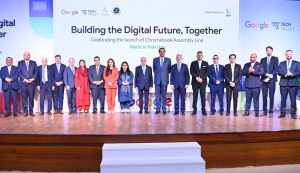Google DeepMind Delays AI Research Publications to Stay Ahead of Competitors

Google DeepMind is reportedly holding back on publishing its artificial intelligence (AI) research to maintain its competitive edge. According to a Financial Times report, co-founder Sir Demis Hassabis has tightened the vetting process, making it harder for researchers to publish papers.
Google DeepMind’s Shift in AI Research Transparency
Google DeepMind, known for its groundbreaking AI advancements, has historically shared its research openly. The 2017 paper on Transformers, which laid the foundation for generative AI models like OpenAI’s ChatGPT, is a prime example. However, the company now enforces a six-month embargo on “strategic” GenAI research before publication.
This shift reflects Google’s effort to prevent rivals from exploiting its work. The change has frustrated Google DeepMind researchers, with some struggling to get GenAI-related papers approved.
Google DeepMind Increased Scrutiny and Selective Publication
Google DeepMind is restricting general AI research publications but continues to release papers on security vulnerabilities under a “responsible disclosure policy.” This policy gives companies time to fix flaws before findings become public.
Competition in AI is intensifying. Companies like OpenAI and Anthropic are racing to develop advanced models. By limiting public access to its latest research, Google DeepMind seeks to maintain a strategic advantage in this fast-moving industry.
The Impact of Google DeepMind’s Policy on AI Innovation
The new policy could reshape AI research transparency. More companies may follow suit to protect their intellectual property. While this may slow the spread of knowledge, it underscores the growing commercialization of AI advancements.
Some experts argue that restricting research publication could hinder AI progress. Open collaboration has historically fueled innovation, allowing researchers to build on existing findings. However, companies like Google DeepMind now face increasing pressure to balance openness with maintaining an edge in the AI market.
Related Links and Resources
- Google DeepMind Official Website
- OpenAI’s Research and Development
- Anthropic’s Approach to AI Development
Final Thoughts
Google’s decision could redefine AI research transparency. As the industry evolves, balancing innovation and competition will remain a key challenge. This shift highlights the growing importance of proprietary AI research in an era of rapid technological advancements. Stay tuned for more updates on the AI landscape and its global impact.






